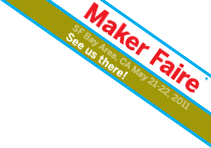Credits
People
Jon Howell originally conceived the rocket, did all the mechanical design and fabrication, built some of the electronics components, and shared (with Jeremy) the job of writing the rocket's operating system and application software.Jeremy Elson designed and fabricated most of the electronics, and co-wrote (with Jon) the operating system and application software.
Grandma Jan created the flight suits.
Noa Dvoskin created our awesome mission logo, which Jon turned into embroidered patches for the flight suit and other rocket accessories.
John Douceur, who has formal electrical engineering training, provided mentoring that made this project possible, given that neither of us (Jon or Jeremy) had designed any non-trivial electronic circuits previously.
Lew Girod also provided a great deal of advice and mentoring on digital design during the project's formative stages.
Alex Tornow and Chase Stephens helped us raise the rocket, transforming it from a pile of parts in the yard into a standing structure.
Evan McLain helped dig the trench through the yard that carries the rocket's air, water, and power.
Mike Sinclair, who runs Microsoft Research's hardware prototyping lab, was kind enough to let us use his lab's 50W CO2 laser cutter to cut and etch all the rocket's acrylic control panels.
Amy Platt and John Feiler, who loaned us their welder for the first couple of weekends.
Companies
Boeing Surplus. Sadly, they're gone now.
Harbor Freight has cheap tools, in both senses of the word. If you weld professionally, you'll hate their welder, but for a weekend project, well, it's hard to argue with a welder that costs less than the pizza party afterward. Much of the pneumatic system (air compressor, many fittings, paint shaker, and “thrusters”) came from here.
OurPCB did a great job of fabricating the printed circuit boards. They're the cheapest we've found, yet their quality is excellent. They're our top choice after days of research on PCB manufacturers.
Dorkbot PDX has a well-run batch PCB fabrication service. They aggregate orders together for people trying to do a very small PCB production run. It's expensive per square inch ($5/sq in for 3 copies, vs. just $0.15/sq in for OurPCB) but they have no setup or shipping cost. OurPCB charges $50 setup plus $35 shipping from China, so Dorkbot is cheaper for one-off boards.
Digi-Key was our source for almost all electronic components. Very wide selection, decent prices, fast and cheap shipping, and sales in small quantities... what more could you ask?
Futurlec is an electronics supplier that's a little trickier to use: they have a fairly narrow selection of products, and they're in Thailand, so everything takes weeks to ship. But they've got incredible prices on things like blank protoboards, potentiometers, keypads, standoffs, sensors, and more.
EBay is a great place to get cheap electronics. First, it is an active market for cheap but functional used lab equipment, like bench power supplies and function generators. Second, it has become the de-facto sales venue for offshore manufacturers selling components (LEDs, solenoid air valves, buttons and switches, etc.) directly to consumers without paying retailers or importers. There's something magical about buying 50 LEDs for $4, and having them arrive 3 weeks later in a paper envelope with Chinese postage and a hand-written address on the front.
Rigol makes a "cheap Chinese knockoff" oscilloscope that actually is incredibly good. Their 1052E, highly recommended by both Jeremy and Jon, is a superb digital storage oscilloscope that is as functional as an HP or Tek scope but at one-tenth the cost.
USBee makes a series of PC-connected oscilloscopes and logic analyzers. Jeremy bought their USBee SX logic analyzer, which is relatively inexpensive, and ended up being vital to developing the TWI network and the SPI protocol that talks to the SD card. The 8-channel SX, which comes with a good PC-based protocol decoder, nicely complements the Rigol analog scope. Jeremy's lab has both.
TAP Plastics is an excellent source of acrylic in the Seattle area. They have a bargain bin of cutoffs (less than 12" on a side) they sell cheap, by the pound; most of the rocket's acrylic is from their bin.
Sparkfun is a great supplier for electronics tinkerers. They provide a wide range of products specifically for people who are hand-assembling one-off projects. For example, they have a wide selection of break-out boards that make surface-mount parts usable in through-hole designs. We used their SD card slot on the audio board.
Adafruit Industries is another boutique electronics supplier targeted at the hobby market. They don't just sell products; they carefully document all their products and disseminate information on how to design similar ones. The rocket doesn't contain any Adafruit parts, but its design greatly benefitted from hours of studying Adafruit's schematics and tutorials.

